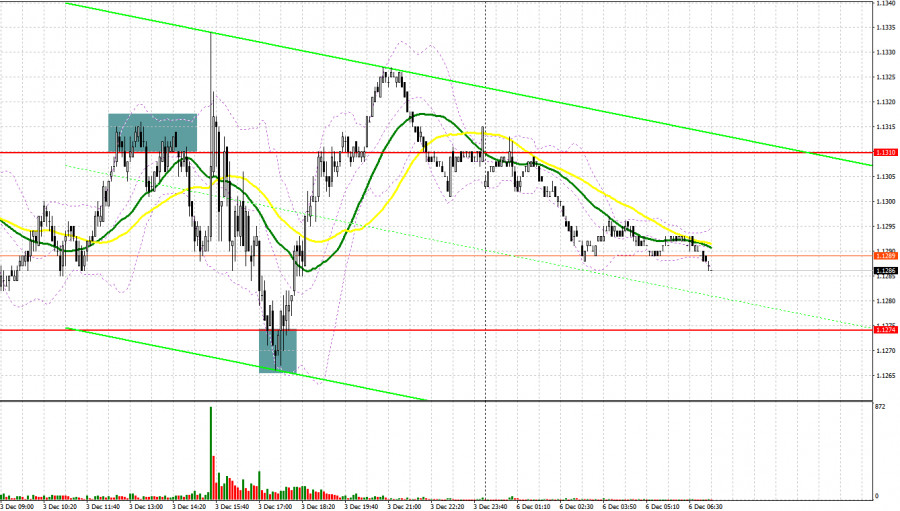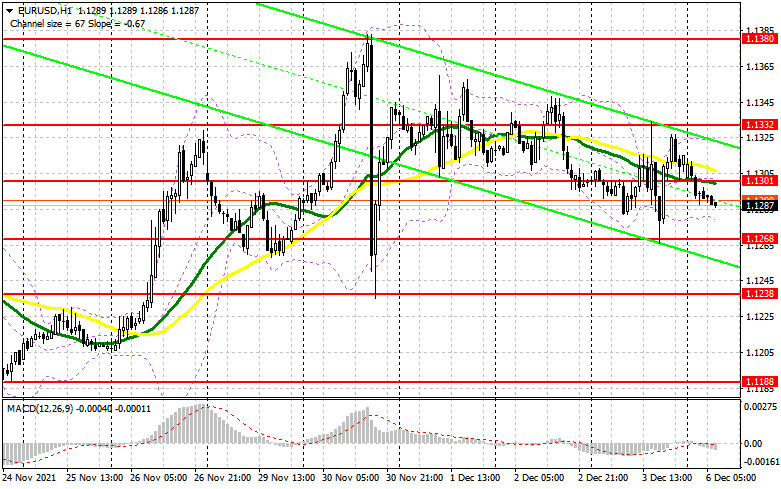To open long positions on EUR/USD, you need:
Several rather interesting market entry points were formed on Friday. Let's take a look at the 5 minute chart and figure it out. Back in the first half of the day, after the release of weak data on activity in the services sector of the eurozone countries, a false breakout at the level of 1.1310 led to forming a signal to sell the euro. However, after a slight decline of 20 points, traders decided to wait for the release of the US labor market report before trading more actively. As a result of the euro's fall to the support area of 1.1274, a false breakout and a signal to open long positions was formed, which brought about 40 points of profit.

The technical picture has slightly changed, however, in general, the pair will continue to trade in a horizontal channel. There are no important statistics today that can seriously affect the euro's direction, so it is best to focus on the middle of the 1.1301 channel. Good data on the change in the volume of orders in the German industry may lead to a break and consolidation above 1.1301, where the moving averages, playing on the side of the bears, pass. A test of this level from top to bottom will provide an excellent entry point with the goal of returning EUR/USD to the area of the upper boundary of the horizontal channel at 1.1332, which we did not manage to get above last Friday. A breakthrough of this range after a strong report on eurozone investor confidence indicator for December this year from Sentix will lead to a larger upward correction to the area of the weekly high of 1.1380, where I recommend taking profits. The next target will be the 1.1442 level. If the pressure on the euro persists in the first half of the day, and traders are disappointed with the reports on the eurozone countries, it is best not to rush into long positions, but wait for the formation of a false breakout in the area of 1.1268. Only such a scenario can provide a good entry point into long positions. If the bulls are not active at this level, it is best to postpone selling until the larger support at 1.1238. I advise you to buy EUR/USD immediately on a rebound from the 1.1188 low, or even lower, around 1.1155, counting on an upward correction of 20-25 points within the day.
To open short positions on EUR/USD, you need:
So far the bears are fulfilling all the tasks assigned to them, but the bears' main task for today is to protect 1.1301, above which the moving averages pass. Forming a false breakout there, together with weak data for Germany and Italy, will provide an excellent entry point for short positions, counting on the resumption of the bearish momentum observed last month. News that a number of European countries have already introduced quarantine restrictions due to a new strain of coronavirus will also put pressure on the euro and a worsening situation with the number of infected people may lead to a larger drop in the pair. An equally important task for the EUR/USD bears is to regain control over the support at 1.1268, which is the lower border of the horizontal channel. Its breakdown and test from the bottom up will lead to the formation of a signal to open short positions with the prospect of a decline to the 1.1238 area. The next target will be the support at 1.1188, where I recommend taking profits. If the euro grows and the bears are not active at 1.1301, it is better to wait with short positions. The optimal scenario will be short positions when a false breakout is formed around 1.1332. You can open short positions immediately on a rebound from the highs: 1.1380 and 1.1442, counting on a downward correction of 15-20 points.

I recommend for review:
The Commitment of Traders (COT) report for November 23 revealed that both short and long positions increased. However, there are still more of the former, which led to an increase in the negative delta. The data on activity in the manufacturing sector of the eurozone countries provided significant support to the euro last week, but the pressure on risky assets remained. A strong US GDP report and Federal Reserve minutes from its last meeting have boosted the dollar as many traders look forward to more aggressive monetary policy changes as early as December this year. However, all this can be prevented by the new strain of the Omicron coronavirus, the spread of which is actively observed in the eurozone and African countries. This strain has not yet been registered in the US, but it is only a matter of time. Bulls can only wait for hawkish statements from European politicians, which were actively sounded last week, which also supported the euro. The latest November COT report indicated that long non-commercial positions rose from 198,181 to 204,214, while short non-commercial positions also jumped from 202,007 to 220,666. At the end of the week, the total non-commercial net position increased to -16,452 against -3,826. The weekly closing price dropped to 1.1241 against 1.1367.
Indicator signals:
Trading is carried out below the 30 and 50 daily moving averages, which indicates the formation of a certain pressure on the euro.
Moving averages
Note: The period and prices of moving averages are considered by the author on the H1 hourly chart and differs from the general definition of the classic daily moving averages on the daily D1 chart.
Bollinger Bands
In case of growth, the upper border of the indicator at 1.1330 will act as resistance. The breakthrough of the lower border in the area of 1.1280 will increase the pressure on the euro.
Description of indicators
- Moving average (moving average, determines the current trend by smoothing out volatility and noise). Period 50. It is marked in yellow on the chart.
- Moving average (moving average, determines the current trend by smoothing out volatility and noise). Period 30. It is marked in green on the chart.
- MACD indicator (Moving Average Convergence/Divergence — convergence/divergence of moving averages) Quick EMA period 12. Slow EMA period to 26. SMA period 9
- Bollinger Bands (Bollinger Bands). Period 20
- Non-commercial speculative traders, such as individual traders, hedge funds, and large institutions that use the futures market for speculative purposes and meet certain requirements.
- Long non-commercial positions represent the total long open position of non-commercial traders.
- Short non-commercial positions represent the total short open position of non-commercial traders.
- Total non-commercial net position is the difference between short and long positions of non-commercial traders.
from RobotFX















 Download NOW!
Download NOW!
No comments:
Post a Comment